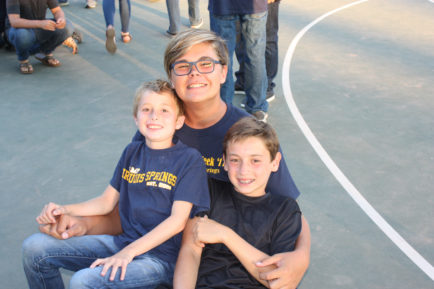Empathy
 Feeling accepted and understood helps children learn how to accept and understand others, become invested in their lives, and practice empathy. Empathy is the ability to put yourself in someone else’s shoes, understand what they may be feeling or experiencing, and respond with care.
Feeling accepted and understood helps children learn how to accept and understand others, become invested in their lives, and practice empathy. Empathy is the ability to put yourself in someone else’s shoes, understand what they may be feeling or experiencing, and respond with care.
Empathy plays a surprising role in predicting a child’s happiness, success and well-being. Empathy is at the core of what makes our children better people. The ability to empathize promotes kindness, and can be the answer to bullying and prejudice. Dr. Joel Haber believes that “empathy is the cornerstone of human behavior and an antidote of bullying.” In today’s world empathy equals success, and may be the most important skill for young adults to get ahead in the 21st century.
Empathy isn’t something you either have or lack, it is a quality that can be taught. It is something that can be fostered by the caring adults in a child’s life. Empathy is what educational psychologist and author Dr. Michele Borba, Unselfie: Why Empathetic Kids Succeed in Our All-About -Me World, believes is the cornerstone for becoming a happy, well-adjusted and successful adult. “It makes our children more likable, more employable, more resilient, better leaders, more conscience-driven, and increases their life spans.” “A world of selfie takers can often make us feel like we are losing our empathetic edge and becoming a more self-absorbed society, but we can teach kids to put the phone down and look around.” When the phones are down and we are face-to-face, we develop emotional literacy. We build authentic and satisfying relationships when we are there for others with understanding and care.
 Summer camp is the ideal place where kids can put down the smart phone and shift from a me to we world, giving them the opportunity for real face-to-face connections and increasing emotional literacy. At camp, we live, eat, sleep and play together. Learning empathy surrounds us at camp in a natural environment. In addition to teaching skills in sports and arts, camp teaches empathy and kindness. Camp staff are strong examples of caring, compassion and understanding, and are true role-models of empathy. Showing empathy is about understanding when a bunkmate is experiencing homesickness, including a friend who feels left out, or supporting someone who just experienced a disappointment. At camp we support, value, and recognize kindness, and looking out for one another becomes contagious. A highlight of evening line-up is when Josh and Rosie announce the campers who have been nominated, by fellow campers, for a “Fuzzy”. A Fuzzy recognizes those who go out of their way to show caring and kindness. Camp also recognizes campers and staff that go above and beyond throughout the year, to give back to others and make a difference in their communities, through our new SPARK program. It’s another opportunity to recognize and celebrate the actions campers and staff make to create a better situation for those around them. It’s encouraging to know that the camp environment allows campers to feel accepted and understood, and in turn, practice empathy.
Summer camp is the ideal place where kids can put down the smart phone and shift from a me to we world, giving them the opportunity for real face-to-face connections and increasing emotional literacy. At camp, we live, eat, sleep and play together. Learning empathy surrounds us at camp in a natural environment. In addition to teaching skills in sports and arts, camp teaches empathy and kindness. Camp staff are strong examples of caring, compassion and understanding, and are true role-models of empathy. Showing empathy is about understanding when a bunkmate is experiencing homesickness, including a friend who feels left out, or supporting someone who just experienced a disappointment. At camp we support, value, and recognize kindness, and looking out for one another becomes contagious. A highlight of evening line-up is when Josh and Rosie announce the campers who have been nominated, by fellow campers, for a “Fuzzy”. A Fuzzy recognizes those who go out of their way to show caring and kindness. Camp also recognizes campers and staff that go above and beyond throughout the year, to give back to others and make a difference in their communities, through our new SPARK program. It’s another opportunity to recognize and celebrate the actions campers and staff make to create a better situation for those around them. It’s encouraging to know that the camp environment allows campers to feel accepted and understood, and in turn, practice empathy.
“When educating the minds of our youth we must not forget to educate their hearts. “
Dalai Lama

